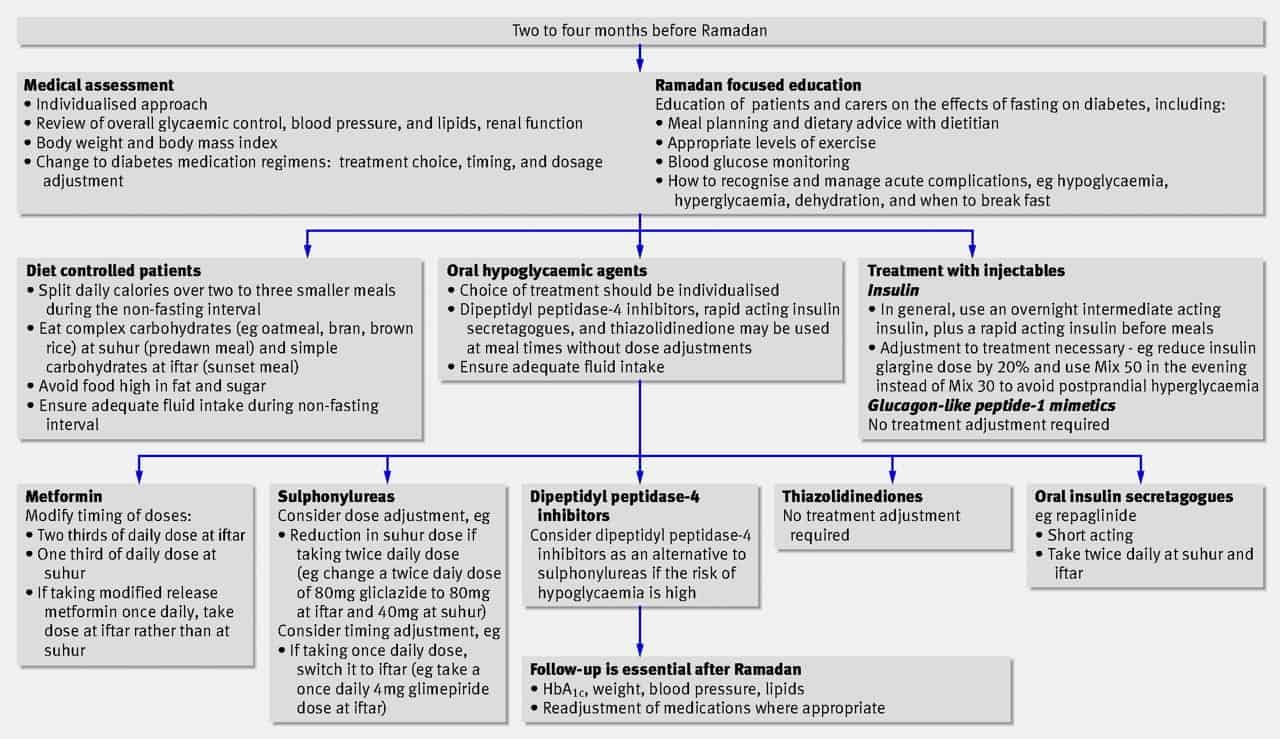 We understand how important Ramadan is
We understand how important Ramadan is
We understand how important Ramadan is for our Muslim patients. It is a holy time and we understand that many of you see it as an honour to do it. During the Islamic holy month of Ramadan, we understand that Muslims are obliged to fast between sunrise and sunset, abstaining from all food and drink during daylight hours. People who are sick, including people with diabetes, do not have to fast during Ramadan as the Koran exempts them from doing so. Despite this, some people with diabetes may still wish to observe Ramadan by fasting. If so, it is important that they seek advice from their diabetes healthcare team in order to understand the risks involved and how these might be reduced.
Why we get worried about fasting in diabetes
Some tablets (sulphonylureas) and insulin can make your blood glucose (sugar) level go low (hypo). If you are not eating but are still taking this type of tablet or insulin, then it is more likely a hypo will happen. Another danger is that you might become dehydrated (not enough fluid/water in your body). This can happen if your blood glucose level is too high (higher than 10mmol/l). Your body tries to lower the blood glucose level by passing urine (water). If you are not drinking (water and tea for example) because you are fasting, then the blood glucose level will get higher still and you can become very ill.
- You must speak to your diabetes doctor or nurse before you fast. They can check how well your body is coping with the diabetes. If they are worried that your body is not coping very well, and there are signs of damage due to high blood glucose levels, then they may recommend you do not fast.
- If you are unwell during the fast, you should test your blood glucose level. This is important as your level can be high or low and you will have to treat this.
- If you have a clinic appointment during Ramadan you can change this for a better time for you to attend. Make sure you speak to your doctor or nurse about this.
People whose diabetes is well controlled by either diet or diabetes drugs may be at lower risk of health problems during fasting than people who have recently experienced complications relating to their diabetes or whose blood glucose is poorly controlled. Doctors are likely to recommend that people at greater risk do not fast at all.
People with diabetes who wish to fast are encouraged to monitor their blood glucose more frequently during fasting, and to remember the usual advice that applies to eating different types of foods. For example, many of the foods that are commonly used to break fast during Ramadan (at Iftar) are high in carbohydrate and fat. The early-morning meal (Sehri) should be eaten as late as possible. Doses of insulin or diabetes drugs will need adjustment. However, if glucose levels become either too high or too low, the fast should be broken immediately.
Changes you can make to what you eat
During Ramadan you have a very different routine for meals. It would usually mean you have two meals a day; the Sehri (early morning meal) which can be eaten as early as 04.00 and the Iftar (after sunset when the fast ends for the day). The Iftar includes large meals with lots of carbohydrate (starchy) food such as chapattis, and rice but also lots of sugary drinks. A lot of the food is fried.
Because you do not eat for a long time, then eat a lot of food which the body changes to glucose, this means your blood glucose level will be low at some times and very high at others. The following suggestions will help to stop this big change in blood glucose level:
- Do not eat so many sugary foods at Iftar. Only have small amounts of food such as ladoo, jelaibi and burfi.
- Eat more starchy food such as basmati rice, chapatti or naan bread to stop you feeling hungry.
- Have fruit, vegetables, dhal and yoghurt in your meals.
- Have your meal at Sehri just before sunrise and not at midnight. This will help to keep your blood glucose levels more evenly balanced.
- When you have a drink, have sugar-free drinks. These can be fizzy drinks or squashes. Drink water if you feel thirsty and do not add sugar to drinks. If you like a sweet drink then use a sweetener such as Canderel or Sweetex.
- Do not have too many fried foods such as paratha, puri, samosas, chevera, pakoras, katlamas, fried kebabs and Bombay mix. When using oil for cooking, be sure to only use 1-2 tablespoons (15-30 mls) for four people.
- A lot of the food used to celebrate Eid-ul-Fitr can make your blood glucose levels rise and also make you put on weight. This is not good if you have diabetes. This does not mean you cannot have such foods, but you must be careful how much you eat.
Medication Changes during Ramadan
Diet-Controlled Diabetics
People who manage their diabetes by what they eat and the amount of physical activity they do, should be able to fast during Ramadan. It is still important to monitor what you eat at the end of a fast.
- You should avoid eating too much sugary and fried food.
- It is important that the diabetes is thoroughly stabilised in the pre-fast period.
- During Ramadan you should adhere to your prescribed diet.
- You should avoid overeating at night during this month.
 Diabetics on oral Diabetic Medication
Diabetics on oral Diabetic Medication
- Before the start of Ramadan, you must speak to a doctor or nurse about your medicines. They will advise you on what to do in order to keep your blood glucose level as near normal as possible during Ramadan.
- For other diabetic patients who require medication, the advice is that that patient with ‘brittle’ diabetes, pregnant women and those with other medical problems should not fast.
- Those on oral medication may have to both adjust the dosage and change to short acting medication, which can be taken at a time to coordinate with the time of the main meal.
Metformin
If you take this tablet on its own to control your blood glucose level, then it should be safe to fast but you may have to change the time of day you take the tablet:
- the tablet should be taken at the end of the fast in the evening
- you may need a lower dose — talk about this with your doctor or nurse
- do not have too many sweet things to eat or sugary drinks.
Glitazones
- These should be taken at about the same time each day.
Sulphonylureas
- The amount you take and the time you take this medicine must be discussed with the doctor or nurse.
Diabetics on Insulin
You may be advised not to fast if you take insulin. If you wish to fast, then you must speak to your doctor or nurse about the type of insulin and amount of insulin you need.
- For diabetics on insulin, the advice is that that patient with ‘brittle’ diabetes, pregnant women and those with other medical problems should not fast.
- Those patients taking insulin will need to change to a twice daily regime of short-acting insulin with the larger dose timed before the main evening meal.
- Particularly with this group of patients regular home measurement of blood sugar is recommended.
A detailed leaflet for Doctors and patients
- Ramadan and Fasting
- Detailed leaflet about how to manage diabetes during Ramadan (good for doctors)
Flowchart for Doctors

